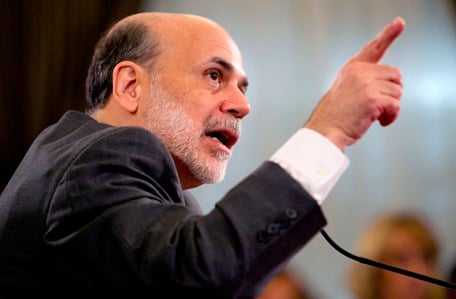The Federal Reserve's action last week to enlarge the U.S. money supply will bolster some stocks and hurt others.
The Federal Reserve's action last week to enlarge the U.S. money supply will bolster some stocks and hurt others.
Pundits are arguing whether the $600 billion of government bond purchases planned by the Fed for the next eight months are enough to get the economy humming again. That misses the point. Twice in the past two years, the central bank has initiated large open-market purchases of government bonds. What it does twice it can do three or four times, if it thinks it needs to inject more money into the economy.
An easier-money climate may produce some inflation -- and that would be just fine with the Fed. It would like a touch of inflation, mainly to reduce the risk of deflation.
The Fed also has a second reason to try to fan a bit of inflation, though it might not say so. In my opinion one major aim of its money-supply expansion is to help make paying off the federal debt less burdensome.
Debtors benefit from inflation because as time passes, their debts are paid off in cheaper dollars. The biggest debtor around, of course, is Uncle Sam.
Also standing to gain from easier money are companies that have borrowed money through long-term loans or bonds. The longer the duration of their debt structure, the more they could benefit.
Benefitting From Inflation
Other beneficiaries of inflation are companies that produce commodities -- everything from steel to oil to gold. In an inflationary environment, they can command increased prices for their hard assets.
Among the commodity producers that may emerge as winners are Reliance Steel & Aluminum Co., W&T Offshore Inc., and Hecla Mining Co.
Reliance Steel, based in Los Angeles, processes and distributes steel, aluminum and other metals. The company may be able to expand its profit margins in an environment of higher metals prices. Its operating margin was 4.7 percent in 2009.
Reliance has $350 million in bonds maturing in 2016 and an additional $250 million maturing in 2036, so it may benefit from being able to pay bondholders back with cheaper dollars as the years pass. It also has some bank debt that is due sooner, but could perhaps be restructured for longer maturity.
W&T Offshore Inc., located in Houston, is a small oil and gas producer focused on the Gulf of Mexico. The past two years have been a struggle for the company. It had to deal with a recession and with the Gulf oil spill. It lost money in both 2008 and 2009. This year analysts believe it will return to profitability.
Contrarian Strategy
That doesn't mean the analysts like W&T stock. They pretty much hate it. Of 13 analysts with opinions, only two say to buy the shares.
The contrarian in me likes that situation. And the cheapskate in me likes W&T's valuations. At seven times earnings, people clearly aren't expecting much from this company, even though it was profitable in its first years as a public company, from 2005 through 2007.
W&T's debt is equal to 99 percent of its equity, so it could benefit from the Fed's indirect rate relief. The debt, which totals $950 million, is all due by 2014, but I imagine that at least some of it will be refinanced over a longer term.
Hecla Mining, based in Coeur D'Alene, Idaho, produces precious metals such as gold and silver. It has mines in production in Alaska and Idaho, and is developing projects in Colorado and Mexico.
Heavy Metal
When I wrote about Hecla back in 1999, it had revenue of $74 million and was losing money. Last year the company's revenue was $313 million and its earned about $68 million in profit.
Hecla is nearly debt-free, so it won't benefit from the so- called cheaper dollars effect. However, it might see the prices of its metals soar relative to the dollar.
To find some companies with a debt structure that might benefit from a cheapening dollar, I ran a screen on the Bloomberg.
Normally I prefer low debt. For this exercise I looked for companies that have higher debt but possess all the other characteristics I normally seek, such as high profitability, decent earnings growth, and low stock valuations.
Eye-Popping Profits
The most intriguing company to pop up was International Business Machines Corp., the world's largest computer-services provider. The Armonk, New York-based company had an eye-popping 74 percent return on equity last year. Its earnings per share growth is also impressive, with a 17 percent average annual growth rate in the past five years.
Yet it does have lots of debt. The computer maker's total long-term debt is almost $22 billion, which is 123 percent of equity. Of that total, $3 billion will be due in 2017, $1.6 billion the next year, and $1.5 billion in 2039.
With that debt structure, IBM seems like an excellent candidate for the Fed's program of indirect debt relief.
The companies most hurt by the Fed's easing program, it seems to me, will be lenders. They lend today's more robust dollars, but will be paid back with tomorrow's vitiated dollars.
One bank I would stay away from is Zions Bancorporation, based in Salt Lake City. Last year Zions lost about $1.2 billion on net interest income of about $1.9 billion.
I would also be wary of Regions Financial Corp., located in Birmingham, Alabama. As of Dec. 31, almost 5 percent of its loans were nonperforming. It lost money the past two years and analysts predict another loss this year.
Disclosure note: I have no long or short positions for myself or clients in the stocks discussed in this week's column.







